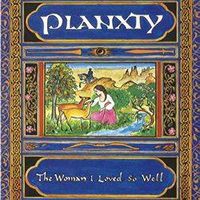Planxty were an Irish folk music band formed in January 1972, consisting initially of Christy Moore, Andy Irvine, Dónal Lunny, and Liam O'Flynn. They transformed and popularized Irish folk music, touring and recording to great acclaim.

Andrew Kennedy Irvine is an Irish folk musician, singer-songwriter, and a founding member of Sweeney's Men, Planxty, Patrick Street, Mozaik, LAPD and Usher's Island. He also featured in duos, with Dónal Lunny, Paul Brady, Mick Hanly, Dick Gaughan, Rens van der Zalm, and Luke Plumb. Irvine plays the mandolin, mandola, bouzouki, harmonica, and hurdy-gurdy.
The Bothy Band are an Irish traditional band, originally active during the mid 1970s. They quickly gained a reputation as one of the most influential bands playing Irish traditional music. Their enthusiasm and musical virtuosity had a significant influence on the Irish traditional music movement that continued well after they disbanded in 1979.
Celtic rock is a genre of folk rock, as well as a form of Celtic fusion which incorporates Celtic music, instrumentation and themes into a rock music context. It has been prolific since the early 1970s and can be seen as a key foundation of the development of successful mainstream Celtic bands and popular musical performers, as well as creating important derivatives through further fusions. It has played a major role in the maintenance and definition of regional and national identities and in fostering a pan-Celtic culture. It has also helped to communicate those cultures to external audiences.

Dónal Lunny is an Irish folk musician and producer. He plays guitar and bouzouki, as well as keyboards and bodhrán. As a founding member of popular bands Planxty, The Bothy Band, Moving Hearts, Coolfin, Mozaik, LAPD, and Usher's Island, he has been at the forefront of the renaissance of Irish traditional music for over five decades.

Prosperous is the second album by Irish folk musician Christy Moore, released in 1972. His first album, Paddy on the Road, was recorded by Dominic Behan in 1969 and has long been out of print. In addition to Moore's guitar and voice, Prosperous featured musicians Andy Irvine, Liam Óg O'Flynn and Dónal Lunny. These four musicians later gave themselves the name Planxty, making this album something of the first Planxty album in all but name. Other musicians included Kevin Conneff on bodhrán, Clive Collins on fiddle, and Dave Bland on concertina.

Kevin Burke is an Irish master fiddler considered one of the finest living Irish fiddlers. For nearly five decades he has been at the forefront of Irish traditional music and Celtic music, performing and recording with the groups The Bothy Band, Patrick Street, and the Celtic Fiddle Festival. He is a 2002 recipient of a National Heritage Fellowship from the National Endowment for the Arts.

Mícheál Ó Domhnaill was an Irish singer, guitarist, composer, and producer who was a major influence on Irish traditional music in the second half of the twentieth century. He is remembered for his innovative work with Skara Brae, the first group to record vocal harmonization in Irish language songs, and The Bothy Band, one of the most influential groups in Irish traditional music. His reputation was enhanced by a successful collaboration with master fiddler Kevin Burke, and his work with the Celtic groups Relativity and Nightnoise, which achieved significant commercial and critical acclaim.

Poguetry in Motion is an EP by The Pogues, released on Stiff Records in the UK on 24 February 1986, and in the US & Canada on MCA Records. It was the band's first single to make the UK Top 40, peaking at number 29 and the first Pogues recording to feature Philip Chevron and Terry Woods.

Irish traditional music is a genre of folk music that developed in Ireland.

Welcome Here Kind Stranger is a 1978 album by Paul Brady. After leaving The Johnstons, Brady toured with Planxty until they disbanded in 1975, and recorded a duo album with Andy Irvine in 1976.

Tríona Ní Dhomhnaill is an acclaimed Irish traditional singer, keyboard player, and composer. She is considered one of the most influential female vocalists in the history of Irish music. Throughout her career, Tríona Ní Dhomhnaill has worked with renowned traditional Irish groups such as Skara Brae, The Bothy Band, and Nightnoise. In February 2024 it was announced that she was to be recognised with a Lifetime Achievement Award at the 6th RTÉ Radio 1 Folk Awards.

Celtic Folkweave is a studio album by Mick Hanly and Mícheál Ó Domhnaill, released in 1974 by Polydor Records. Considered a seminal album in the traditional Irish music genre, the musicians involved in the recording would go on to found some of the most innovative and important groups to perform traditional Irish music.

The Woman I Loved So Well is the fifth studio album by Planxty. Like their previous album, After The Break, the album was recorded at Windmill Lane Studios and released by Tara Records. Co-produced by band member Dónal Lunny and engineer Brian Masterson, the album was recorded in April and May of 1980 and released on LP in July of that year. It remains in print on CD and in digital form from Tara to date.

The Iron Behind the Velvet is an album recorded by Christy Moore in 1978, after the first breakup of Planxty. It was produced jointly by Brian Masterson and Moore, and recorded and mixed at Lombard and Keystone Studios, Dublin.

Paddy Murphy (1913-1992) is regarded as a founding father of modern Irish concertina music.

H Block is an album recorded by various Irish folk artists, and produced by Christy Moore in 1978.

Between the Jigs and the Reels: A Retrospective is a two-disc anthology by the Irish folk band Planxty. It includes a 17-track CD and a 36-track DVD with over two hours of previously unreleased footage (1972–1982) from RTÉ archives.
Mick Hanly is an Irish singer and composer from Limerick. In the 1970s, he formed several folk music duos, first with Mícheál Ó Domhnaill, then with Andy Irvine and, more recently, with Dónal Lunny. From 1982 until 1985, he was a member of Moving Hearts. Hanly is known for composing "Past the Point of Rescue", which was first covered by Mary Black (1988) and also by American artist Hal Ketchum (1991).















